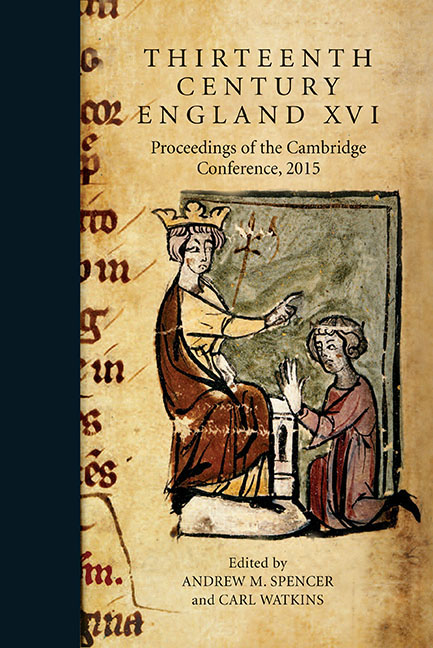Book contents
- Frontmatter
- CONTENTS
- List of Illustrations
- List of Contributors
- List of Abbreviations
- Introduction
- The Uncertainties of Reformers: Collective Anxieties and Strategic Discourses
- Moral Dilemmas in English Confessors’ Manuals
- Damnatio Eternae Mortis or Medicinalis Non Mortalis: The Ambiguities of Excommunication in Thirteenth-Century England
- The Contribution of Thomas Docking to the History of Political Thought
- Dealing with Inadequate Kingship: Uncertain Responses from Magna Carta to Deposition, 1199–1327
- The Rebel's Four Dilemmas in the Long Thirteenth Century
- The Daughters of William the Lion and Queen Ermengarde
- Simon de Montfort and the Ambiguity of Ethnicity in Thirteenth-Century Politics
- The Hue and Cry in Thirteenth-Century England
- Recalling Anglo-Scottish Relations in 1291: Historical Knowledge, Monastic Memory and the Edwardian Inquests
Damnatio Eternae Mortis or Medicinalis Non Mortalis: The Ambiguities of Excommunication in Thirteenth-Century England
Published online by Cambridge University Press: 23 August 2019
- Frontmatter
- CONTENTS
- List of Illustrations
- List of Contributors
- List of Abbreviations
- Introduction
- The Uncertainties of Reformers: Collective Anxieties and Strategic Discourses
- Moral Dilemmas in English Confessors’ Manuals
- Damnatio Eternae Mortis or Medicinalis Non Mortalis: The Ambiguities of Excommunication in Thirteenth-Century England
- The Contribution of Thomas Docking to the History of Political Thought
- Dealing with Inadequate Kingship: Uncertain Responses from Magna Carta to Deposition, 1199–1327
- The Rebel's Four Dilemmas in the Long Thirteenth Century
- The Daughters of William the Lion and Queen Ermengarde
- Simon de Montfort and the Ambiguity of Ethnicity in Thirteenth-Century Politics
- The Hue and Cry in Thirteenth-Century England
- Recalling Anglo-Scottish Relations in 1291: Historical Knowledge, Monastic Memory and the Edwardian Inquests
Summary
Excommunication resulted in complete separation from the Christian community. This basic definition can be accepted without difficulty. To go further, however, is problematic. Excommunication's precise implications were far from clear. An excommunicate was to be shunned by all other Christians; he or she could not be buried in ecclesiastical ground and was unable to sue in court. Yet excommunication was also a spiritual sanction. A frequently cited canon from Gratian's Decretum defined anathema as ‘damnation of eternal death’. Nevertheless, in 1245, at the first Council of Lyons, Pope Innocent IV emphatically asserted, ‘Excommunication is medicine not death, discipline not annihilation.’ This decree, known as ‘Cum medicinalis’, added to an already significant body of canon law intended to ensure that clerics used excommunication justly, and sparingly. In the same period, theologians had reached a consensus that excommunication was not a curse and did not send a person to hell. Yet excommunication continued to be ‘burdened with great ambivalence’, as Elisabeth Vodola has observed. Despite the definition in ‘Cum medicinalis’ and the assurances of theologians, it was not uncommon throughout the Middle Ages for both churchmen and laymen to believe that excommunication resulted in ‘misfortune in this world and damnation in the next’.
This observation is hardly new. Martin Luther complained about the problem as early as 1518. The most full study of this tension is Alexander Murray's 1991 John Coffin Memorial Lecture, in which he explores the complexity of the issues at stake. Vodola and R.H. Helmholz have likewise carefully noted that excommunication remained linked to cursing long after the thirteenth century. Nevertheless, the years surrounding 1200 have been seen as a turning point. Thus for Vodola, by the early thirteenth century, ‘it was evident … that major excommunication concerned only the punishment that detained a soul in purgatory, not the guilt that consigned it to hell’. Helmholz has described a competition during the twelfth century between two conceptions of excommunication: judicial sanction versus powerful curse. He argues that the former had won a (qualified) victory by the end of the century. That the first writs ordering recalcitrant excommunicates to be detained by the secular arm date from the beginning of the thirteenth century further indicates a watershed in the development of excommunication around this time.
- Type
- Chapter
- Information
- Thirteenth Century England XVIProceedings of the Cambridge Conference, 2015, pp. 37 - 54Publisher: Boydell & BrewerPrint publication year: 2017
- 1
- Cited by



